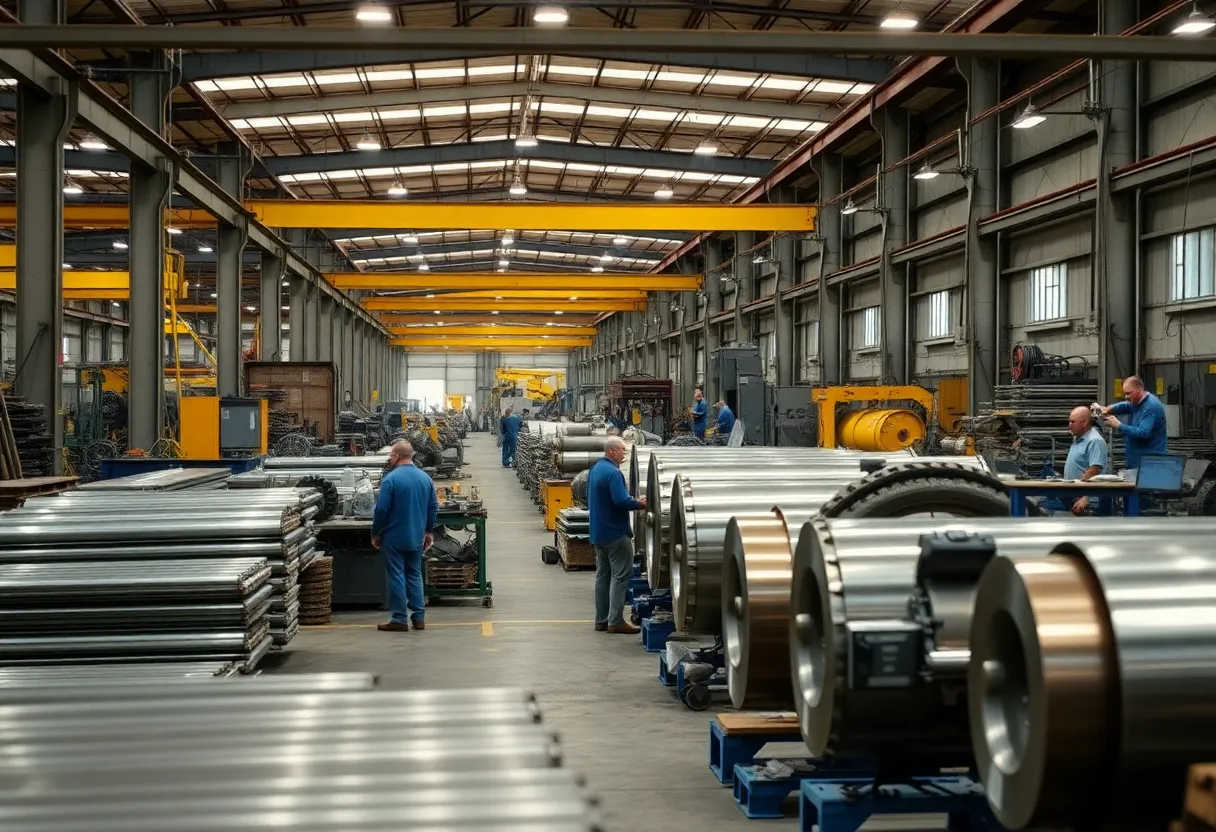News Summary
Spartanburg County Councilman David Britt raises concerns over 25% tariffs on aluminum and steel imports, warning that they may adversely affect local businesses and lead to job losses. With increasing prices for consumers, industries reliant on steel, such as construction and manufacturing, could face difficult choices ahead. Britt, along with local economists, stress the need for cooperative international trade policies to maintain economic growth and attract foreign investment, particularly from major employers like BMW Manufacturing.
Spartanburg County, South Carolina – Spartanburg County Councilman David Britt has raised concerns about the recently announced 25 percent tariffs on aluminum and steel imports, arguing that these measures may have detrimental effects on local businesses. As the chair of the council’s economic development committee, Britt believes that the president is receiving “bad advice” regarding trade policies that could be harmful to the economy.
Britt anticipates that increased tariffs will not only drive up prices for consumers but also severely affect local companies that rely on steel products. He pointed out that manufacturing and construction sectors, in particular, will be significantly impacted. Businesses may soon face difficult choices, such as whether to absorb the higher costs or limit new purchases. This dilemma could lead to potential job losses within these industries.
Concerns are echoed by Carlos Phillips, President of the Greenville Chamber of Commerce, who notes that tariffs can disrupt the businesses along the supply chain, further increasing production costs. While the Trump administration insists that tariffs serve as a valuable economic policy and a tool for negotiating trade fairness, critics warn that these moves could escalate into a costly trade war, undermining the very principles of free trade.
Economists have varying perspectives on the implications of targeted tariffs. Some, like William Hauk, acknowledge that tariffs can garner political popularity if their impact on consumers remains minimal. However, he indicates that industries such as auto, aerospace, appliance, and construction are likely to experience negative ramifications due to these tariff policies.
BMW Manufacturing, based in Spartanburg, has also stated that tariffs obstruct free trade, thereby stifling innovation and growth. This concern is shared by David Wise, CEO of Harper Construction, who foresees that the rising costs associated with tariffs will lead to heightened overall building expenses. Conversely, Charles Wall, president of SC Steel, reports an uptick in orders as businesses anticipate rising steel prices, suggesting a potentially positive economic outcome for some sectors.
The current tariffs are not the first introduced by President Trump; similar tariffs were instituted in 2018, which resulted in increased consumer prices and job losses in various sectors. Local economists are particularly worried that retaliatory tariffs from other countries could adversely affect South Carolina’s agricultural industry.
Britt has expressed particular concerns regarding the message these tariffs may send to trading partners, notably Canada’s and Mexico’s. He supports the focus on securing U.S. borders but believes that cooperation with international companies is pivotal for the economic prosperity of Spartanburg.
As a proactive measure, Britt intends to invite President Trump to Spartanburg to demonstrate the advantages of maintaining free trade principles. Local leaders face challenges in supporting the administration’s policies while also advocating for foreign firms like BMW that significantly contribute to the local economy. The recent derogatory comments from Navarro regarding BMW have exacerbated tensions among Republican leaders in South Carolina, prompting local representatives—including U.S. Rep. William Timmons—to defend BMW’s contributions and criticize Navarro’s assertions.
Looking to the future, BMW plans to expand its operations in Spartanburg, including a significant investment of $1.7 billion aimed at enhancing electric vehicle assembly and battery production. This commitment reinforces the importance of foreign investment in the local economy, as the Spartanburg plant stands as the nation’s largest automotive exporter by value.
As local leaders navigate this complex landscape shaped by tariffs and trade policies, the ongoing discussions surrounding the economic implications of these changes will likely remain a central focus for the community and its businesses.
Deeper Dive: News & Info About This Topic
- The Washington Post: BMW and Trump’s Trade Tariffs
- Wikipedia: Tariff
- Fox Carolina: Concern Over Tariffs
- Google Search: Trump tariffs South Carolina
- Greenville Online: Business Leaders on Trump’s Tariffs
- Google Scholar: Trump tariffs South Carolina
- Post and Courier: BMW and Tariffs
- Encyclopedia Britannica: Trade Tariffs
- The New York Times: South Carolina and Tariffs
- Google News: South Carolina BMW tariffs

Author: STAFF HERE FLORENCE WRITER
The FLORENCE STAFF WRITER represents the experienced team at HEREFlorence.com, your go-to source for actionable local news and information in Florence, Florence County, and beyond. Specializing in "news you can use," we cover essential topics like product reviews for personal and business needs, local business directories, politics, real estate trends, neighborhood insights, and state news affecting the area—with deep expertise drawn from years of dedicated reporting and strong community input, including local press releases and business updates. We deliver top reporting on high-value events such as the Florence Festival of Lights, Pee Dee Pride, and agricultural expos at the Florence Center. Our coverage extends to key organizations like the Florence Regional Chamber of Commerce and the Pee Dee Area Council of Governments, plus leading businesses in healthcare and retail that power the local economy such as McLeod Health and Pee Dee Electric Cooperative. As part of the broader HERE network, including HERECharleston.com, HEREColumbia.com, HEREGreenville.com, and HEREHiltonHead.com, we provide comprehensive, credible insights into South Carolina's dynamic landscape.





